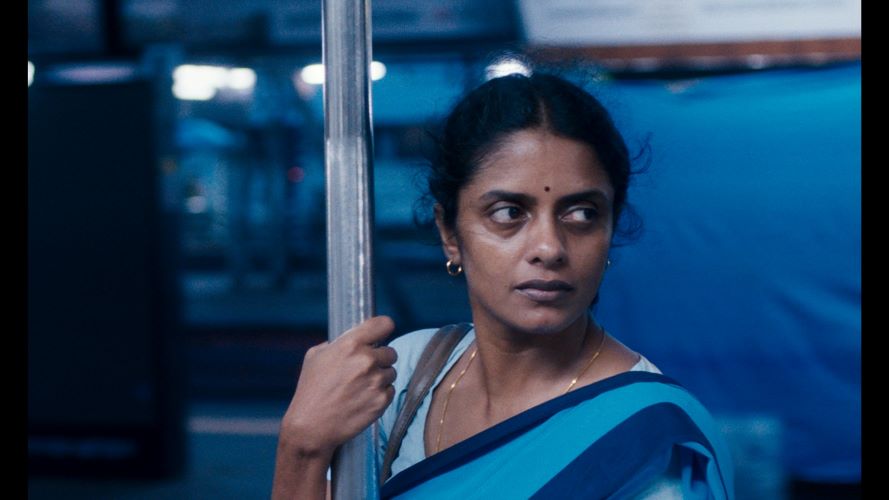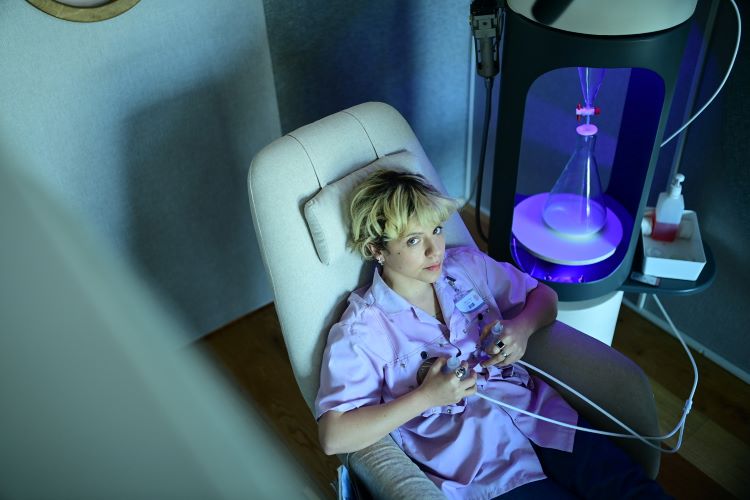
More flash reviews – first impressions from the films I’ve been seeing at the Jerusalem Film Festival.
Santosh
Santosh (Shahana Goswami) is reeling from the death of her beloved husband Raman, a policeman who was killed during a riot. Suddenly, at 28, she is bereft of her love and her future, and placed in the awkward position of dependence on family – her own and her in-laws, neither of which seem inclined to take her in. Naïve and grieving, she is offered the opportunity to take part in a government plan to recruit and train women as police officers. Written and directed by Sanhya Suri, Santosh’s trajectory reflects the texture of culture and caste in India, taking on issues of systemic misogyny and corruption.
Wide-eyed and eager to learn, Santosh is a keen observer and the viewer experiences everything from her perspective. She cares about justice, yet her efforts to help a Dalit man whose daughter Devika is missing, are useless against the ingrained prejudice of the system. When Devika’s lifeless body is found in the local well, a woman – Inspector Geeta Sharma (Sunita Rajwar) – is brought in to lead the inspection, and she becomes a mentor to Santosh. The relationship between the two women is fascinating and complex and reveals different aspects of each woman’s character.
Holy Cow
Louise Courvoisier’s debut feature film is one of the relatively rare feel-good festival films. Totone (Clément Faveau) leads a carefree life, hanging out with his friends, drinking, and occasionally hooking up. His father’s death leaves him in charge of his 5-year-old sister Claire (Luna Garret) and Totone sort of steps up but is essentially an impulsive kid at heart. His attempts to take on a steady job and get his sister to school on time are filled with missteps, and when he overcomes his general genial tendency to aimlessness to take on a goal, it’s a lot closer to a daydream than a realistic aim.
Totone goes for it with all his youthful energy, few moral qualms, and a lot of help from his friends. Claire is a lot more tolerant, helpful and mature than once would expect from such a young child, but that is perhaps the result of growing up alongside Totone. It’s fun to follow their lively adventures.
All We Imagine as Light
Winner of the Grand Prix at the 2024 Cannes Film Festival, All We Imagine as Light, written and directed by Payal Kapadia tells the story of two very different women against the backdrop of life in Mumbai. Prabha (Kani Kusruti) is an experienced nurse dedicated to her job, yet devoid of a personal life. Although she is very caring towards her patients, and sincerely helpful to her fellow nurses, she does not seek out fun or friendship, keeping her distance from others. This is due in part to her difficult personal status – following an arranged marriage, her husband left India to work in Germany, and she has not had any contact with him for over a year.
Anu (Divya Prabha) is young and full of life, and seems to see her job as an unavoidable intrusion between clandestine meetings with her Muslim boyfriend Shiaz (Hridhu Haroon). Where Prabha follows tradition at the cost of repressing her feelings, hopes, and dreams, Anu, albeit secretly, defies the strict traditions of her family, and although her future is uncertain, is eager to experience the pleasure of the present moment.
Kusruti embodies Prabha with a visage of secret sorrow, and a stiff demeanor that conceals a tender heart. When their fellow nurse Parvaty (Chhaya Kadam) moves back to her village, Prabha and Anu help her on the journey, and the move away from the crowds and noise of the city gives each of them the space to consider her life and choices. Poetic in its rhythms and images, it’s a beautiful film.

The Milky Way
Singer-songwriter Hila Ruach is very appealing and relatable as Tala, a struggling musician who has just had a baby and is trying to figure out motherhood while earning a living selling her breast milk. Written and directed by Maya Kenig, the film depicts a dystopian milk factory where new mothers in need of money sit in cubicles, attached to a breast pump, while looking at photos of their babies to encourage better flow. Quirky and full of humor, the film takes an honest look at the overwhelming aspects of motherhood, as Tala’s life is plunged into turmoil by the tiny creature (the baby is very cute) she has brought into the world.
It’s also very much about the economic divide, in which Tala and her fellow factory workers pump breast milk for the babies of the rich, while their own babies end up drinking formula. Tala’s encounter with Nili (Hadas Yaron) delineates this divide, as a complex relationship develops that is mutually beneficial and even affectionate, yet always marked by an imbalance of power. Lots of fun and thought-provoking.
Screening times, tickets, and additional information may be found on the Jerusalem Film Festival website.





